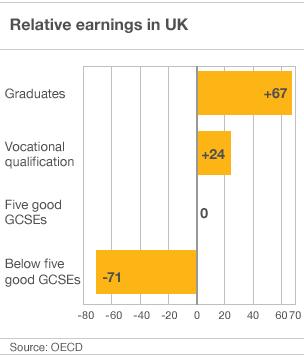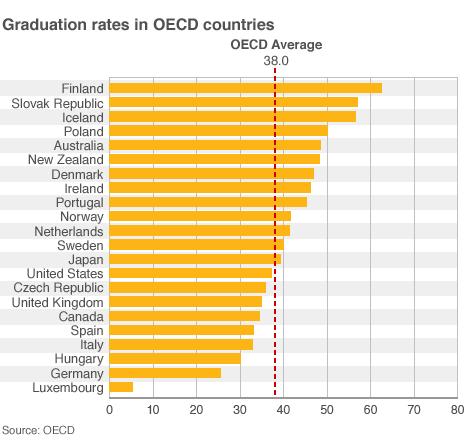UK slipping down graduate league
- Published

Graduate numbers in the UK have not kept pace with international rivals
The UK is slipping behind its international rivals in the number of graduates, according to a report.
Between 2000 and 2008, it fell from third highest to fifteenth among top industrialised nations for the proportion of young people graduating.
The UK now trails higher education systems in Poland, Iceland, Portugal and Slovakia.
This means it is not a good time to cut investment in university, says the report from the OECD.
The report by the Organisation for Economic Co-operation and Development says there are no signs that the increased cost of university is outweighing the benefits to students.
"Fewer people with qualifications will mean a less successful economy," says Andreas Schleicher, the OECD's special adviser on education.
"Cutting education is going to cut the tax returns of the future."
Strong competition
The Russell Group of leading universities has warned that further cuts would relegate the UK's higher education system "to a lower division of higher education quality from which we would struggle ever to recover".
This annual report from the OECD surveys the changes in education systems in almost 40 leading industrialised economies.
It shows strong international competition to expand higher education - with the proportion of young people getting degrees in OECD countries doubling between 1995 and 2008, from 20% to 40%.
The UK has been increasing the number of students, but the OECD report says that it has failed to keep pace with the even more rapid growth elsewhere.
The UK lags behind countries including Poland, Australia, Ireland, the Slovak Republic, Portugal and the Czech Republic - as well as the traditional high performers such as Finland, Iceland, Sweden and Norway.
Finland has the highest graduation rate among young people - 46% of men and 80% women - compared with 30% of men and 40% of women in the UK, with these latest OECD figures drawn from 2008.
The OECD's report, which looks at education from an economic perspective, argues that both individuals and the wider economy gain an advantage from increasing graduate numbers.
Mr Schleicher says that unemployment rates remain much lower for graduates than non-graduates.
Graduates are also continuing to earn more than non-graduates - even though in the UK there has been an erosion of that advantage.
The report also shows that about one in four graduates in the UK take non-graduate jobs.
Lack of places
Taxpayers benefit from investing in higher education, says the OECD. Even though the government subsidises students, this is outweighed by the increased revenue from higher tax from better-paid jobs.

The OECD says that in the UK each extra graduate brings $89,000 (£58,000) to the taxpayer over a working life.
While the UK was slipping behind, Mr Schleicher identified Australia and New Zealand as this year's high achievers at university level - and highlighted the success of Finland, Japan and Canada at school level.
Tens of thousands of applicants failed to get university places in the UK this year - with tough financial constraints on extra places.
Universities and student leaders have also warned about the impact of any further public spending cuts.
"At a time when many of our competitors are investing in higher education and research as a way out of the recession, we cannot afford to be left behind," says Steve Smith, president of Universities UK.
President of the National Union of Students Aaron Porter said: "With the UK already being left behind other countries in its graduation rates and public funding, a double whammy of short-sighted funding cuts and arbitrary limits on student places will make matters far worse in the years ahead."
Sally Hunt, head of the UCU lecturers' union, warned that the "coalition government's refusal to fund sufficient university places this summer will come back to haunt us".
"Today's report shows a worrying decline in the UK's standing in the world of education. We have plummeted down the graduate league table, going from a major player to a relegation candidate in less than a decade," she said.
Wendy Piatt, director general of the Russell Group of leading universities, warned that other countries would benefit if the UK cut spending.
"While our universities are bracing themselves for a period of austerity and uncertainty, other nations are rightly pumping billions of dollars into their institutions at this key time before the world economy picks up," said Dr Piatt.
Universities Minister David Willetts said the report showed that higher education "faces some real challenges, which the government is determined to tackle".
"We have already taken action to boost student numbers by funding an extra 10,000 places and more people than ever are starting university this autumn."

Estimated percentages of 2008 age cohort which will complete first-time academic degrees, out of 26 OECD countries, plus Australia figure for 2007.